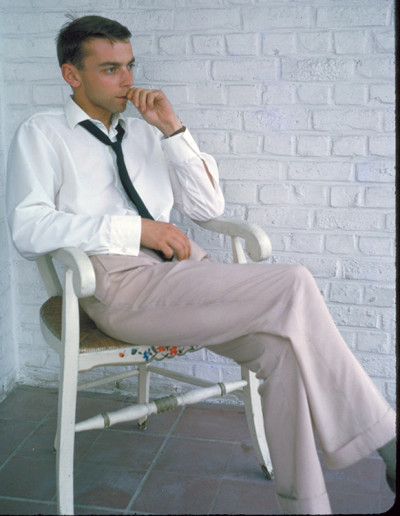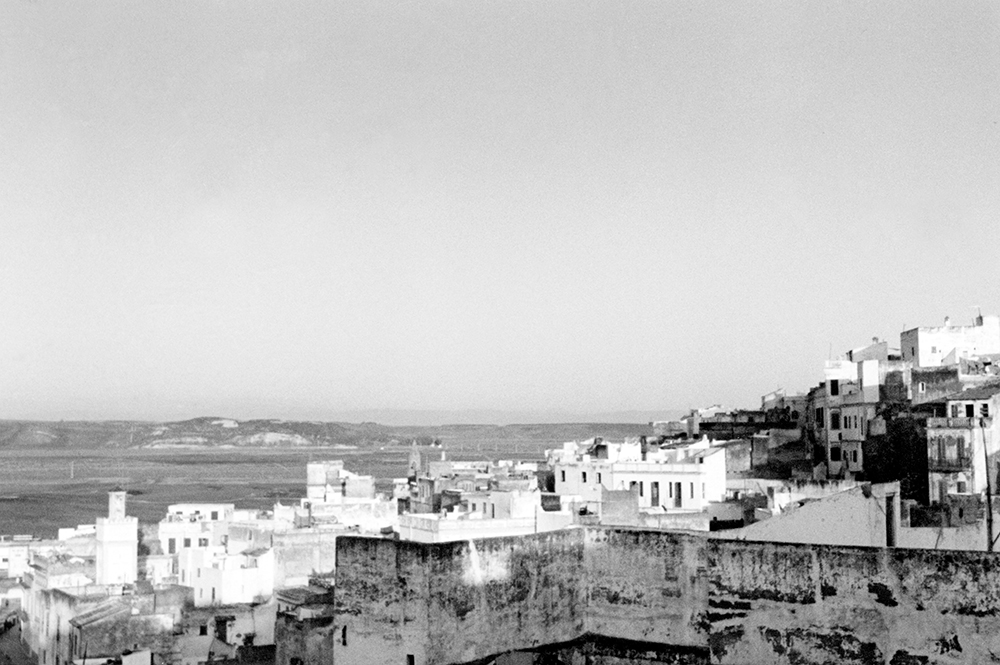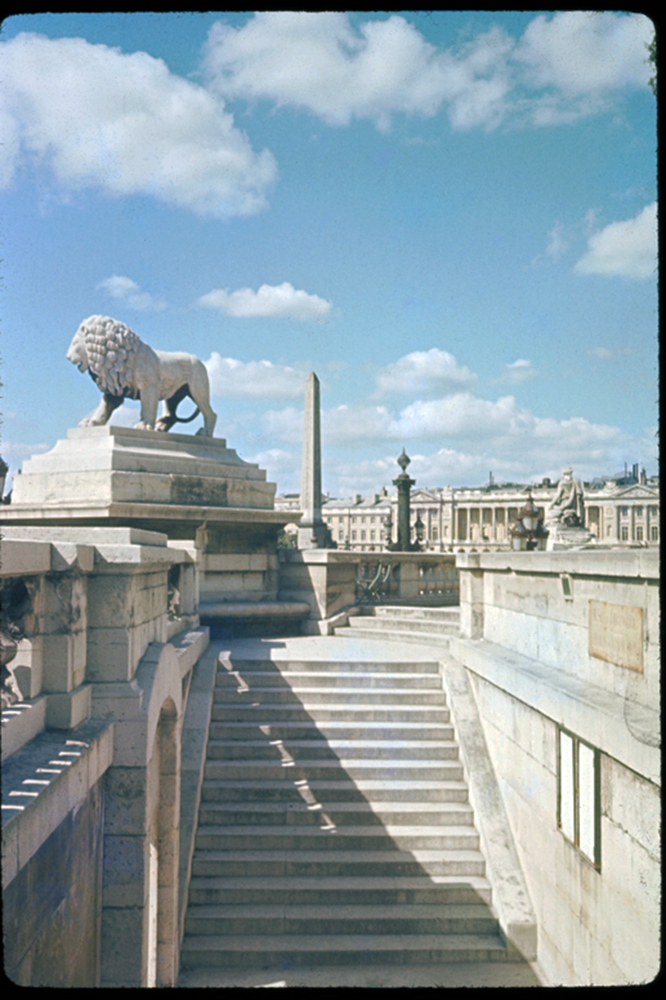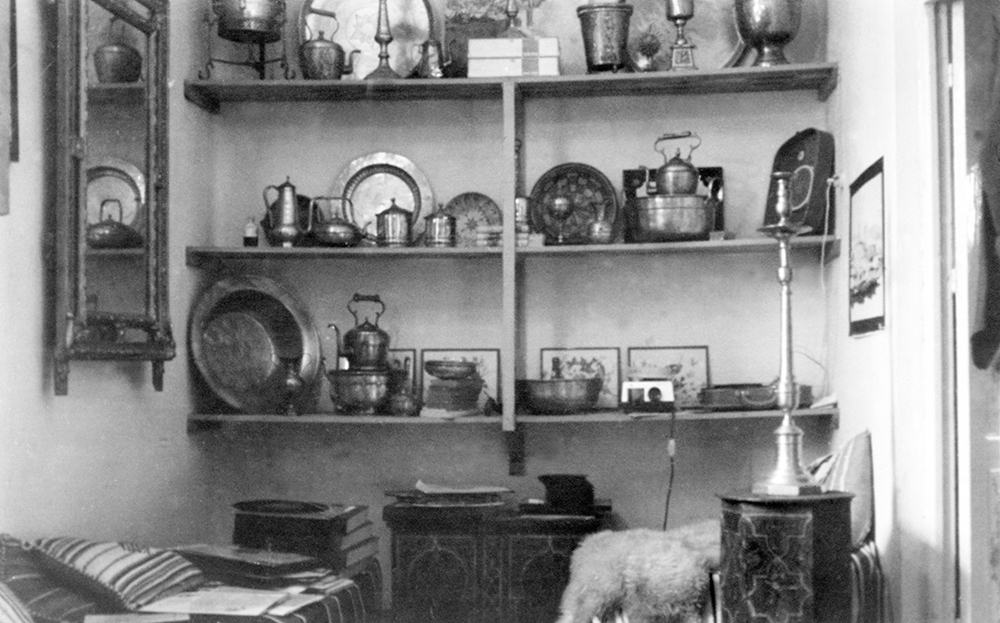Jan Mensaert entered the Keep This Quiet! series in vol. I. I first met him in Casablanca, Morocco, on a trip. And immediately traveled by bus back with him to Larache, where he was teaching French. A Belgian from Flemish Brabant, he spoke French fluently. Likewise English. Four years passed, and we did not meet. But in those few intense days in Morocco, I was knocked overboard by my impression of him as a true artist. It wasn't even a romance at the time. And what might have been two ships passing in the night had blossomed through letters. The jaw-dropping one below hurried me into a decision to fly to Belgium and revisit. My initial intent, however, was to use him to inspire a character in my next novel. He was too unusual, too unique, I thought, for my novelistic self not to see him at least once more. This letter set up that meeting. Instead of deterring me, it lured me on. I was at MacDowell Colony for artists, finishing up my first book (I thought), when it arrived. The excerpt below is from Keep This Quiet!
I began like this: " A very dramatic letter slid in, like a baseball player putting his foot onto the plate. It was from Jean-Marie. It fulfilled his role of inevitably, touchingly—with the right balance of art and reality—providing something so extreme it sounded like fiction." Strangely, December 27, twenty-two years later, would be the day of Jan's suicide:
27 December, 1968
My best wishes for a merry Christmas, a happy New Year with plenty of American astronauts on the moon and food in Biafra and a meeting between the two of us . . . I’ve actually started thinking of those Spanish dances [he’d promised to write] . . . I am thinking so well that I’ve got six of them all clear in my mind and a little more confusedly in my fingers. The left hand is pretty rough. But it’s hell to write them down. I’ve started with the simplest one and my eyes are dazzling with little black spots and bars and keys and stars of inspiration. I’m afraid it will go with my olé-olé music the way it went with [letters, etc.] . . . It may sound like something made by an Eskimo on a six month’s night after reading the Alhambra Tales . . .
The Spanish Dances survived 30 risky years in my storage. In 2001, the old reel was delicately put into modern CD format. They are now uploaded in YouTube music clips. Just click to listen. But back to the serious part of the letter. Immediately he begins to catch me up, being an invariable storyteller:
And now for the wild story of my last adventure . . . when I took the train to Athens the intention wasn’t to pray on the moonlit Acropolis but to get to Santorini and have a very good time—lived with six Swiss air hostesses whom I happened to get acquainted with and which were spending their holiday there in a wonderful house built with so many terraces on the caldeira—and then, when money and air-hostesses were about to be going, committed suicide, or at least tried very hard to. It was very well planned; drank a gallon and a pint of ouzo, hid with a couple of spiders in a dark corner and cut a couple of veins and nerves of my upper arm.
Blood came spouting and I felt very happy. And then something happened which I still can’t explain. I wasn’t suffering, I wasn’t afraid of dying—that’s what the ouzo was for—I was lying there and felt very comfortable and satisfied with the things being, went on drinking and singing and thinking of Thailand and Morocco and Margaret of the good olden days which would never return and then suddenly I got up and ran for the nearest-by place. Not for help. I realize now that I was only looking for human companionship, that I didn’t want to die with only spiders for company. Got to a café—this thrilling story takes place in a spooky little hamlet high up on the warm and misty cliffs of an exploded volcano, where Hephaistos dwells and Orpheus sings his songs of woe—and was a sensation. I enjoyed it. The owner ran for the Swiss girls and they came and hugged me and kissed me and spilt their sweet tears on my face and took off their stockings to bind off my arm and never succeeded, while all around me people were quarreling about what had and hadn’t to be done. I forget what happened next. Didn’t faint, it was the effect of the ouzo. When I sobered up. I was lying on an improvised operation table and still bleeding.
I confess it most humbly, I panicked. Inwardly, that is. I was sure now I was going to die and the sensation isn’t an agreeable one when one (hm!) isn’t drunk. The blood kept spouting and filling the back of my trousers and everybody was trying to stop it and touched the cut nerves and it was like having your 32 teeth extracted at the same time while my heart was hurting like hell. Then finally when I was hearing the angels singing and the bells tolling and a Swiss girl asking for a glass of brandy something very much like a doctor came and said abracadabra while burning herbs unknown to me and stopped the bleeding. It was morning by then and I was to be flown to Athens but somehow nobody knew where the helicopter who was to do the job was. So I was carried down the 600 and so many steps to the port, was put on a ship where everybody thought they were bringing a corpse. Because of the sun they had completely covered me with a blanket. In the Piraeus hospital nobody seemed to know narcotics had been invented some years ago and so, while they were sewing up my nerves, I swore I would never try to commit suicide again and die as an antique dealer. Stayed in the hospital for about a week and then decided to go to Prague . . .
It didn't end there:
Had a rotten Christmas, though a white one. Slept. True to my oath I’ve become an antique dealer. . . . Never met so much vanity in my life . . . The shop has been open for not even four weeks and I’ve sold for 3.000 dollars worth, representing 2.000 dollars benefit. I would never have expected it . . .
Going on with my life story and resuming it, flew from Athens to Prague and got there one day before the Russians did, fell in love with the Czechs, an admirable lot, came back to Belgium, after having been thrown out by the Russians, and am busy having my arm reeducated. This seems to be a failure, it’s lamer than it ever was. Even my fingers, of which I still had control one month ago, are giving it up. Yesterday I’ve tried to record your Spanish dances in a simplified version. It was laughable. Am smoking tar-filled cigarettes now hoping for a lung cancer which, I am told, is the less painful species of cancer being . . .
Burned my last novel, which may have been good, my last poems, which were excellent, I know, would burn my paintings but they weren’t worth the trouble. A Gotterdammerung mood. It’s rotten to have an artist’s sensibility and desires and ups and downs and not to be one.
Instead of wringing my hands, I remembered the playful, twenty-eight-year-old at his home (above) in Larache. And was intrigued and of course frightened. Clicking here, you can experience him playing a honkeytonk tune he wrote. Playing it in high speed. (Likewise miraculously salvaged on the tape in 2001.) I marveled that "this letter was a little treasure: How could the experience that should have accented pain accent humor; that should have accented transformation instead accent close observation?" It was "the artistic personality," at its most visible, I concluded.
I saw this lifestyle inside “the artistic personality”—though I was huddled down, secretive, throwing my black coat over my manuscript pages on the floor if Milton came to the door unexpectedly. No one could even see the sheets of paper.
At Columbia University I had loved a passage in Henry James’s The Ambassadors—in my paraphrase: “Live, live, live, it’s a mistake not to!” More recently Milton had mentioned—in joking warning—“the lineaments of unlived lines.”
In my book I played up his self-portrait as a “teabag steeped in life” (or that he had a “face like a creekbed”). I named the character Robert—not for (but in that way like) Robert Penn Warren, who one day walked past my office, his craggy wrinkles in full display.Alternately, I very much thrived—and still do—on ideas. Milton noted the “metaphysics of your structure.”
Keep THIS Quiet Too! changes continents and cultures. From sophisticated New York City and hip Greenwich Village, reuniting with Belgian poet Jan Mensaert in Germany - captivated by his eternal-youth charm and poet maudit artistic potential - I rejected all advice to the contrary and married. Then moved with him to Larache.

Jan got there by way of many travels prior to meeting me. Many of the photographic shots in his archives show narrow entrances and exits. Below is a stairs with a narrow shadow.
Jan's apartment in Larache, when I first met him, was a big surprise; it had a Western record player and piles of LPs, including lots of classical; also a collection of brass and copper knickknacks. But the kitchen was typically Moroccan, with fresh local food cooked on charcoal. (No refrigerator.) I kept up the tradition when I moved in there.
At the bottom of this page is one of many drawings Jan made, sitting at his desk, waiting to start writing. Though freehand doodles, they are strikingly detailed. He said, "My first ambition was to be an architect." This one is a cathedral. Others were witty and humorous. I bought the whole package of art. If only he'd be a bit more stable. I tried. He resisted. We had fun; both wrote. But eventually this bohemian life, I was sure, on my part, had to end. Anyway, it did. Not, though, without a lot of stories. And many cultures broadening my vista. I hope everyone gets the chance to see how people live around the world. No education is finer.
Giving me advice about Jan throughout, with depth visible in the directness and sometimes shock value, was Milton Klonsky, whom - after marriage - I saw one day a year. As introduced in volume one, he's in the series to stay. Whenever I traveled back to the U.S., I stopped in New York City just to get his take on my life, the trials I'd, sometimes farcically, been through since we last met. No wisdom keeper could have heard me out better. I copied down his phrases like little finely cut diamonds, which you'll find in KTQ Too!
For instance, one of the most dramatic bits of very serious advice said was regarding Jan's self-destructiveness:
Give him something to rise to. Don't sink with him. Or sink with him. And then kill yourself. But don't be a bystander while this man commits suicide.
That may be the boldest, bluntest thing anyone ever said to me. It was way out of left field. But it fit the circumstances. He was worried about me. He gave me a stern warning.

Naturally, Hunter Thompson is on the scene as well. Or off stage. Sometimes on. Sometimes only with letters. In the end of KTQ Too!, he's there in person at his ranch for an attempt to get the romance actually in "the history books." Well, it worked up to a point.
A passionately written memoir that doesn’t sit around being fit and proper and straight laced. . . . As a key to the lives of these three writers it is idiosyncratic and in age where blandness is the norm, it is a pleasure to go on her journey and find out a little about what made these men tick and what drove her to them—Eric Jacobs, Beat Scene (UK)
At times adventurous, at times sensual, Keep THIS Quiet Too! hinges upon the complexities of human relationships, especially the challenges posed by the heart-wrenching feelings of love that may or may not be fully requited. Highly recommended—Midwest Book Review


